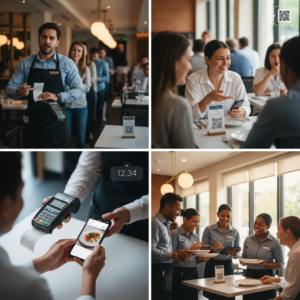Running a restaurant in Pakistan is already a dynamic challenge, from perfecting recipes to managing staff. Add FBR POS compliance to the mix, and it can feel like navigating a maze! If terms like “FBR retail sector POS system issues” or the proper “POS invoice” make you uneasy, you’re not alone. The Federal Board of Revenue (FBR) is serious about digitizing sales, and understanding these rules is crucial for every Pakistani restaurant owner. Let’s simplify it and ensure your business stays on the right side of the law.
FBR POS Compliance in Pakistan: The Big Picture
FBR POS Compliance in Pakistan refers to a crucial government initiative. It’s the mandatory integration of your Point of Sale (POS) systems with the Federal Board of Revenue’s (FBR) central invoicing and tax reporting system. The main goal? To make all business transactions digital, expand the tax base, and reduce tax evasion by getting real-time sales reports.
This digital shift means every sale at your restaurant can be tracked instantly by the FBR, making tax reporting transparent and accurate.
Key Aspects of FBR POS Compliance You Must Know
Understanding these points will help you grasp the full scope of FBR compliance:
- Mandatory for Tier-1 Retailers: This is a big one! All Tier-1 retailers, which often includes many restaurants, are legally required to integrate their POS systems with the FBR’s digital invoicing system.
- Who is a Tier-1 Retailer? The FBR defines a Tier-1 retailer as a business falling into one or more categories, including:
- Operating as part of a national or international chain of stores.
- Operating in an air-conditioned shopping mall, plaza, or center (excluding kiosks).
- Having a cumulative electricity bill exceeding PKR 1.2 million in the last 12 months.
- Being a wholesaler-cum-retailer.
- Having acquired a POS for accepting debit/credit cards or other digital payments.
- Whose withholding tax under sections 236G or 236H exceeded a specified threshold.
- Who is a Tier-1 Retailer? The FBR defines a Tier-1 retailer as a business falling into one or more categories, including:
- Real-time Data Transmission: When you make a sale, your integrated POS system sends that data instantly to the FBR. The FBR then gives back a unique “fiscal invoice number” which your POS prints on the receipt along with the FBR logo and a QR code.
- Invoice Verification for Customers: Your customers can actually check if their invoice is authentic! They just use the FBR’s “Tax Asaan App” to scan the QR code on their receipt and see the tax details. This builds trust!
- Government Enforcement & Incentives: The FBR isn’t just asking nicely. They can disallow a large portion (60%) of input tax adjustments for businesses that aren’t integrated. They also encourage compliance with prize draws for customers who verify their POS invoices.
Latest FBR E-Invoicing Deadlines for Businesses in Pakistan
The FBR has set clear deadlines for different types of businesses to comply with e-invoicing. It’s crucial to be aware of these:
- July 1, 2025: All corporate registered persons (this includes many larger restaurants and restaurant chains) must have completed their e-Invoicing integrations.
- August 1, 2025: Non-corporate taxpayers (which can include smaller, sole-proprietor restaurants) must register with the FBR to complete their integration.
Source: FBR official notifications and tax advisory updates. For detailed legal provisions, refer to the FBR website.
Understanding Your FBR-Compliant “POS Invoice”
An FBR-compliant POS invoice is far more than just a regular receipt. It’s a digital document that meets specific FBR requirements and is transmitted to their system the moment a sale occurs.
What makes a POS invoice FBR-compliant?
- Unique FBR Invoice Number: Every invoice gets a special, system-generated number from the FBR.
- Digital Signature: This ensures the invoice’s authenticity and prevents tampering.
- QR Code: This code is printed directly on the receipt, allowing customers to easily verify the invoice using the “Tax Asaan App” or by sending an SMS to 9966.
- Detailed Information: The invoice must include all necessary details like seller and buyer info (if applicable), item descriptions, tax rates, any discounts, and the total amount.
- Real-time Transmission: The invoice data is sent to FBR instantly as the sale is finalized.
Common “FBR Retail Sector POS System Issues” and How to Overcome Them
Many businesses, including restaurants, have faced challenges during FBR POS integration. The Federal Tax Ombudsman (FTO) has even highlighted some of these persistent “FBR POS system issues“:
- System Glitches & Disconnections: Sometimes, the integration might face technical errors, showing your POS as “disconnected” even if it’s working.
- Integration Costs: While PRAL (FBR’s IT arm) now offers free integration services as per SRO 69(I)/2025, some third-party integrators used to charge significant fees.
- Missing Invoice Uploads: Invoices might not reach FBR servers due to technical hiccups or poor connectivity.
- Lack of Technical Support: Businesses sometimes struggle to get timely help for their FBR integration problems.
- Security Token Expiry: The digital tokens that allow your POS to communicate with FBR can expire, causing disconnections if not renewed. (FTO now recommends a 5-year validity with prior notice.)
- Operational Slowdowns: Some businesses fear that real-time verification might slow down their operations, especially during peak hours.
The good news is that the FTO has actively worked to resolve these issues, making compliance smoother for businesses. FBR is also planning to expand POS installations to over 500,000 devices nationwide.
This blog is for informational purposes only. We do not offer tax advice or compliance services, nor are we affiliated with the Federal Board of Revenue (FBR). For accurate guidance and legal information, please visit the official FBR website. This post is part of our effort to cover trending topics and to help people access simplified information on a complex topic.
Steps for Your Restaurant to Comply with FBR POS
Getting your restaurant FBR compliant might seem daunting, but here are the key steps:
- Register with FBR: First, ensure your business is properly registered with the FBR and you have your Sales Tax Registration Number (STRN).
- Select a Compliant POS System: Choose an FBR-approved POS system that is compatible with the FBR’s platforms. Look for providers that specifically mention FBR integration.
- Submit Business & POS Details: Provide your necessary business information and POS details through the FBR portal as required.
- Operate & Sync Data: Once integrated, all transactions at your POS must be electronically transmitted to FBR in real-time, automatically generating compliant fiscal invoices.
- Stay Updated: FBR frequently issues Sales Tax General Orders (STGOs) and other notifications. Stay informed to ensure continuous compliance.
How To Ensure Your FBR Compliance
Navigating FBR requirements can be complex, but fortunately, there are several reliable resources available to assist you:
- FBR Official Website (www.fbr.gov.pk): This is your primary source for all official rules, notifications (SROs), and legal provisions related to FBR POS integration. You can also find FAQs and tutorials here.
- FBR Helplines & Control Rooms:
- FBR General Helpline: 051 111 772 772 (Monday to Friday, 8:30 a.m. to 11:30 p.m.)
- POS Control Room: 051-9106002/051-9106003 (9 a.m. to 5:00 p.m.) or WhatsApp: 0337-9766410 (9 a.m. to 12:00 p.m.). This dedicated control room is specifically for POS integration issues.
- Email: helpline@fbr.gov.pk
- PRAL (Pakistan Revenue Automation Limited): As the FBR’s IT arm, PRAL is often involved in providing free integration services. They are a licensed integrator and can provide technical support for connecting your POS system to FBR. You can often find their contact details and list of licensed integrators on the FBR website.
- Professional Tax Consultants: For personalized advice and hands-on assistance, consider hiring a reputable tax consultant. These experts can guide you through the registration, integration, and ongoing compliance processes, ensuring you avoid common pitfalls.
By utilizing these resources, you can ensure your restaurant remains compliant, avoiding penalties and running your business smoothly.
Frequently Asked Questions (FAQs) on FBR POS & Compliance
Q1: Do all restaurants in Pakistan need FBR POS integration?
A: Businesses classified as Tier-1 retailers (which includes many restaurants based on criteria like being a chain, operating in an AC mall, or electricity consumption) or those registered under sales tax laws are primarily targeted and are mandated to integrate.
Q2: How can a customer verify an FBR POS invoice?
A: Customers can verify their digitally generated POS invoice through the FBR Tax Asaan App (by entering the invoice number or scanning the QR code) or by sending the invoice number via SMS to 9966.
Q3: What are the risks of not complying with FBR POS integration?
A: Non-compliance can lead to severe penalties, including hefty fines (up to Rs. 50,000 or 5% of tax due), disallowing up to 60% of input tax adjustments, sealing of your business premises, difficulties with tax returns, and potential legal action.
Q4: Is there a fee for FBR POS integration?
A: While some third-party integrators may charge, FBR’s own IT arm, PRAL, is directed to provide free integration services as per recent regulations (e.g., SRO 69(I)/2025). Ensure you clarify this with your chosen POS provider.
Quick Quiz: Are You FBR Compliant?
Test your knowledge about FBR POS compliance!
1. Which government body in Pakistan mandates POS integration for businesses?
- Ministry of Finance
- State Bank of Pakistan
- Federal Board of Revenue (FBR)
- Provincial Revenue Authority
2. What important feature should be present on an FBR-compliant POS invoice for customer verification?
- A photo of the chef
- A unique FBR Invoice Number and QR code
- A customer’s favorite dish
- A discount coupon for the next visit
3. What is a common issue faced by businesses with FBR POS integration in Pakistan, as highlighted by the FTO?
- Too many customers are visiting
- System glitches and missing invoice uploads
- Too much free time for owners
- Overly simple reports
4. What is the deadline for corporate registered persons to complete their e-invoicing integration as per recent FBR updates?
- June 1, 2025
- July 1, 2025
- August 1, 2025
- December 31, 2025
(Scroll down for answers!)
Quiz Answers:
- c) Federal Board of Revenue (FBR)
- b) A unique FBR Invoice Number and QR code
- b) System glitches and missing invoice uploads
- b) July 1, 2025
This blog is for informational purposes only. We do not offer tax advice or compliance services, nor are we affiliated with the Federal Board of Revenue (FBR). For accurate guidance and legal information, please visit the official FBR website. Additionally this post is part of our effort to cover trending topics and to help people access simplified information on a complex topic.
References:
- FBR POS Legal Provisions: https://www.fbr.gov.pk/pos-legal-provisions/163085/163086
- FBR Sales Tax General Order – Tier-1: https://www.fbr.gov.pk/sales-tax-general-order-tier-1/163085/173442
- Moreover, For updated SROs and FAQs, refer to the FBR website (e.g., https://fbr.gov.pk/faqs/173967/173969) and recent press releases.




